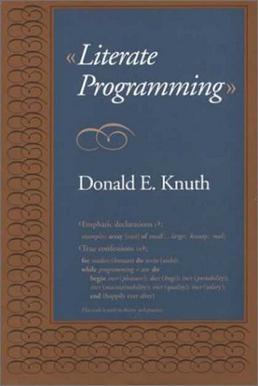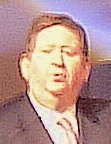
Brian Wilson Kernighan is a Canadian computer scientist. He worked at Bell Labs and contributed to the development of Unix alongside Unix creators Ken Thompson and Dennis Ritchie. Kernighan's name became widely known through co-authorship of the first book on the C programming language with Dennis Ritchie. Kernighan affirmed that he had no part in the design of the C language.
B is a programming language developed at Bell Labs circa 1969 by Ken Thompson and Dennis Ritchie.
In computing, a compiler is a computer program that translates computer code written in one programming language into another language. The name "compiler" is primarily used for programs that translate source code from a high-level programming language to a low-level programming language to create an executable program.

Literate programming is a programming paradigm introduced in 1984 by Donald Knuth in which a computer program is given as an explanation of how it works in a natural language, such as English, interspersed (embedded) with snippets of macros and traditional source code, from which compilable source code can be generated. The approach is used in scientific computing and in data science routinely for reproducible research and open access purposes. Literate programming tools are used by millions of programmers today.

In computer programming, a macro is a rule or pattern that specifies how a certain input should be mapped to a replacement output. Applying a macro to an input is known as macro expansion. The input and output may be a sequence of lexical tokens or characters, or a syntax tree. Character macros are supported in software applications to make it easy to invoke common command sequences. Token and tree macros are supported in some programming languages to enable code reuse or to extend the language, sometimes for domain-specific languages.
SNOBOL is a series of programming languages developed between 1962 and 1967 at AT&T Bell Laboratories by David J. Farber, Ralph E. Griswold and Ivan P. Polonsky, culminating in SNOBOL4. It was one of a number of text-string-oriented languages developed during the 1950s and 1960s; others included COMIT and TRAC.
troff, short for "typesetter roff", is the major component of a document processing system developed by Bell Labs for the Unix operating system. troff and the related nroff were both developed from the original roff.
Joseph Frank Ossanna, Jr. was an American electrical engineer and computer programmer who worked as a member of the technical staff at the Bell Telephone Laboratories in Murray Hill, New Jersey. He became actively engaged in the software design of Multics, a general-purpose operating system used at Bell.
roff is a typesetting markup language. As the first Unix text-formatting computer program, it is a predecessor of the nroff and troff document processing systems.

The Unix philosophy, originated by Ken Thompson, is a set of cultural norms and philosophical approaches to minimalist, modular software development. It is based on the experience of leading developers of the Unix operating system. Early Unix developers were important in bringing the concepts of modularity and reusability into software engineering practice, spawning a "software tools" movement. Over time, the leading developers of Unix established a set of cultural norms for developing software; these norms became as important and influential as the technology of Unix itself, and have been termed the "Unix philosophy."
Robert H. Morris Sr. was an American cryptographer and computer scientist.
TRACLanguage is a programming language developed between 1959–1964 by Calvin Mooers and first implemented on the PDP-1 in 1964 by L. Peter Deutsch. It was one of three "first languages" recommended by Ted Nelson in Computer Lib. TRAC T64 was used until at least 1984, when Mooers updated it to TRAC T84.

Stuart Feldman is an American computer scientist. He is best known as the creator of the computer software program make. He was also an author of the first Fortran 77 compiler, was part of the original group at Bell Labs that created the Unix operating system, and participated in development of the ALTRAN and EFL programming languages.

The history of Unix dates back to the mid-1960s, when the Massachusetts Institute of Technology, AT&T Bell Labs, and General Electric were jointly developing an experimental time-sharing operating system called Multics for the GE-645 mainframe. Multics introduced many innovations, but also had many problems. Bell Labs, frustrated by the size and complexity of Multics but not its aims, slowly pulled out of the project. Their last researchers to leave Multics – among them Ken Thompson, Dennis Ritchie, Doug McIlroy, and Joe Ossanna – decided to redo the work, but on a much smaller scale.
ALTRAN is a programming language for the formal manipulation of rational functions of several variables with integer coefficients. It was developed at Bell Labs in 1960s. ALTRAN is a FORTRAN version of ALPAK rational algebra package, and “can be thought of as a variant of FORTRAN with the addition of an extra declaration, the ‘algebraic’ type declaration.”

In computing, a compiler is a computer program that transforms source code written in a programming language or computer language, into another computer language. The most common reason for transforming source code is to create an executable program.

Unix is a family of multitasking, multi-user computer operating systems that derive from the original AT&T Unix, whose development started in 1969 at the Bell Labs research center by Ken Thompson, Dennis Ritchie, and others.

Kenneth Lane Thompson is an American pioneer of computer science. Thompson worked at Bell Labs for most of his career where he designed and implemented the original Unix operating system. He also invented the B programming language, the direct predecessor to the C programming language, and was one of the creators and early developers of the Plan 9 operating system. Since 2006, Thompson has worked at Google, where he co-developed the Go programming language.

Lorinda Cherry was an American computer scientist and programmer. Much of her career was spent at Bell Labs, where she was for many years a member of the original Unix Lab. Cherry developed several mathematical tools and utilities for text formatting and analysis, and influenced the creation of others.

In computing TMG (TransMoGrifier) is a recursive descent compiler-compiler developed by Robert M. McClure and presented in 1965. TMG ran on systems including OS/360 and early Unix. It was used to build EPL, an early version of PL/I.












